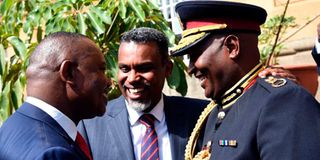Scramble for state positions: Where the axe will likely fall

Directorate of Criminal Investigations head George Kinoti, Director of Public Prosecutions Noordin Haji and Inspector-General of Police Hillary Mutyambai in Nairobi on April 8, 2019.
Every change of regime brings a substantial exit of key government personnel, and that is to be expected if President-Elect William Ruto’s victory is confirmed.
While he will just be moving up a step from Deputy President, his will not be so much a continuation of the Jubilee government, but a hostile takeover following the fallout with President Uhuru Kenyatta that saw Dr Ruto lead a walkout from the ruling party and successfully run for president.
Installation of a government automatically ends the tenure of Cabinet and Principal Secretaries, which will give Dr Ruto instant opportunity to shape the administration in his image.
Dr Ruto will be happy to see the backs of the likes of Interior Cabinet Secretary Fred Matiangi and PS Karanja Kibicho, who Kenya Kwanza alliance has accused of employing the state security and administration machinery to frustrate the Deputy President and campaign for main rival Raila Odinga.
Other Cabinet Secretaries who at some time or other publicly backed the Raila campaign are Joe Mucheru (ICT), Peter Munya (Agriculture), James Macharia (Transport and Infrastructure), Eugene Wamalwa (Defence) and, to a lesser extent Ukur Yatani (National Treasury and Mutahi Kagwe (Health).
But there are dozens of other key public offices that any incoming president always ensures are almost immediately filled with loyalists.
These include offices that are usually presidential appointments, especially in the security establishment, national government administration, policy-making and delivery institutions, strategic installations, statutory bodies and state corporations.
In the security sector where Dr Ruto has directed much of his anger, number one of those who should not even be thinking about anything but the exit door would be the Director of Criminal Investigations George Kinoti.
Directly and through his social media propaganda networks, Dr Ruto has consistently accused the career police officer of directing a spate of politically-motivated investigations and arrests targeting him and supporters.
He has been a target of vicious attacks by Dr Ruto’s so-called “Hustler National Intelligence Bureau” run by Kenya Kwanza social media propagandist Dennis Itumbi.
Also on the radar, though not as directly accused, would be Inspector-General of Police Hillary Mutyambai, who crossed over to the top police job from the National Intelligence Service, a shift that corresponded with President Uhuru Kenyatta’s passion for placing military and intelligence types in key institutions.
The other security organ an incoming president prioritises is the National Intelligence Service (NIS), currently headed by Maj-Gen Philip Wachira Kameru.
Like all spy chiefs the NIS boss keeps a low profile and never publicly comments on political or other issues.
However, Maj-Gen Kameru was thrust into the maelstrom in June when Dr Kibicho told a gathering that intelligence surveys showed Mr Odinga comfortably beating Dr Ruto.
The Ruto campaign furiously demanded a clarification from the general who did not respond.
But Dr Ruto also had a counter-narrative, saying no such poll findings existed and, to the contrary, NIS polls showed him ahead in the presidential race.
Though Dr Ruto has always distanced himself from Jubilee administration failures on the basis that he had been shut out of government since the Uhuru-Raila alliance sealed in 2018, he claimed that he received intelligence reports even before the President.
A few days before the August 9 elections, Dr Ruto convened a media briefing at his Karen official residence where he demanded that Maj-Gen Kameru issues a statement on the national security situation in the country.
He claimed, without giving evidence, that key government officials reporting to President Kenyatta were planning to instigate violence.
Other officials who have drawn the wrath of Dr Ruto are Director of Public Prosecutions Noordin Haji and Ethics and Anti-Corruption Commission CEO Twalib Mbarak.
They are part of a trio, alongside, DCI Kinoti, who have been accused of driving politically-motivated investigations, arrests and prosecutions in which key Ruto allies have been ensnared on corruption and other criminal charges.
Dr Ruto’s campaign manifesto includes the pledge to halt “weaponisation” of the criminal justice system, which many in his camp translate to installing a more pliable regime and halting the contentious probes and court cases.
DP-elect Rigathi Gachagua has stated that a corruption case against him in which Sh200 million has been seized as proceeds of crime will be halted and the money returned.
Mr Haji, another graduate of the NIS, was appointed DPP in March 2018, and together with Mr Kinoti who was appointed DCI two months earlier, formed a formidable team tasked to kick-start President Kenyatta’s war against corruption that had floundered since first declared in 2015.
The two earned plaudits for within the short time investigating and driving crimal charges against Treasury CS Henry Rotich, Migori Governor Okoth Obado, as well as large number of directors and senior managers of state agencies, including the National Youth Service, Kenya Power and Kenya Pipeline.
The campaign earned the pair public adulation, but before a string of complaints from the Ruto camp that his allies were being targeted.
The anti-corruption war was bolstered in 2019 when another Intelligence Service operative Twalib Mbarak was appointed to the EACC.
Another Kenyatta appointee from the military most certainly be on his way out is Lt-Gen Mohammed Badi, head of the Nairobi Metropolitan Service.





